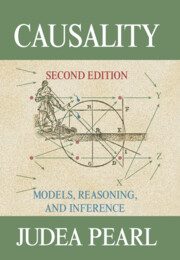Book contents
- Frontmatter
- Dedication
- Contents
- Preface to the First Edition
- Preface to the Second Edition
- 1 Introduction to Probabilities, Graphs, and Causal Models
- 2 A Theory of Inferred Causation
- 3 Causal Diagrams and the Identification of Causal Effects
- 4 Actions, Plans, and Direct Effects
- 5 Causality and Structural Models in Social Science and Economics
- 6 Simpson’s Paradox, Confounding, and Collapsibility
- 7 The Logic of Structure-Based Counterfactuals
- 8 Imperfect Experiments: Bounding Effects and Counterfactuals
- 9 Probability of Causation: Interpretation and Identification
- 10 The Actual Cause
- 11 Reflections, Elaborations, and Discussions with Readers
- Epilogue The Art and Science of Cause and Effect
- Bibliography
- Name Index
- Subject Index
8 - Imperfect Experiments: Bounding Effects and Counterfactuals
Published online by Cambridge University Press: 05 March 2013
- Frontmatter
- Dedication
- Contents
- Preface to the First Edition
- Preface to the Second Edition
- 1 Introduction to Probabilities, Graphs, and Causal Models
- 2 A Theory of Inferred Causation
- 3 Causal Diagrams and the Identification of Causal Effects
- 4 Actions, Plans, and Direct Effects
- 5 Causality and Structural Models in Social Science and Economics
- 6 Simpson’s Paradox, Confounding, and Collapsibility
- 7 The Logic of Structure-Based Counterfactuals
- 8 Imperfect Experiments: Bounding Effects and Counterfactuals
- 9 Probability of Causation: Interpretation and Identification
- 10 The Actual Cause
- 11 Reflections, Elaborations, and Discussions with Readers
- Epilogue The Art and Science of Cause and Effect
- Bibliography
- Name Index
- Subject Index
Summary
Would that I could discover truth as easily as I can uncover falsehood.
Cicero (44 B.C.)Preface
In this chapter we describe how graphical and counterfactual models (Sections 3.2 and 7.1) can combine to elicit causal information from imperfect experiments: experiments that deviate from the ideal protocol of randomized control. A common deviation occurs, for example, when subjects in a randomized clinical trial do not fully comply with their assigned treatment, thus compromising the identification of causal effects. When conditions for identification are not met, the best one can do is derive bounds for the quantities of interest – namely, a range of possible values that represents our ignorance about the data-generating process and that cannot be improved with increasing sample size. This chapter demonstrates (i) that such bounds can be derived by simple algebraic methods, (ii) that, despite the imperfection of the experiments, the derived bounds can yield significant and sometimes accurate information on the impact of a policy on the entire population as well as on a particular individual in the study, and (iii) that prior knowledge can be harnessed effectively to obtain Bayesian estimates of those impacts.
INTRODUCTION
Imperfect and Indirect Experiments
Standard experimental studies in the biological, medical, and behavioral sciences invariably invoke the instrument of randomized control; that is, subjects are assigned at random to various groups (or treatments or programs), and the mean differences between participants in different groups are regarded as measures of the efficacies of the associated programs. Deviations from this ideal setup may take place either by failure to meet any of the experimental requirements or by deliberate attempts to relax these requirements. Indirect experiments are studies in which randomized control is either unfeasible or undesirable. In such experiments, subjects are still assigned at random to various groups, but members of each group are simply encouraged (rather than forced) to participate in the program associated with the group; it is up to the individuals to select among the programs.
Recently, use of strict randomization in social and medical experimentation has been questioned for three major reasons.
1. Perfect control is hard to achieve or ascertain. Studies in which treatment is assumed to be randomized may be marred by uncontrolled imperfect compliance. For example, subjects experiencing adverse reactions to an experimental drug may decide to reduce the assigned dosage.
- Type
- Chapter
- Information
- CausalityModels, Reasoning, and Inference, pp. 259 - 282Publisher: Cambridge University PressPrint publication year: 2009
- 1
- Cited by



